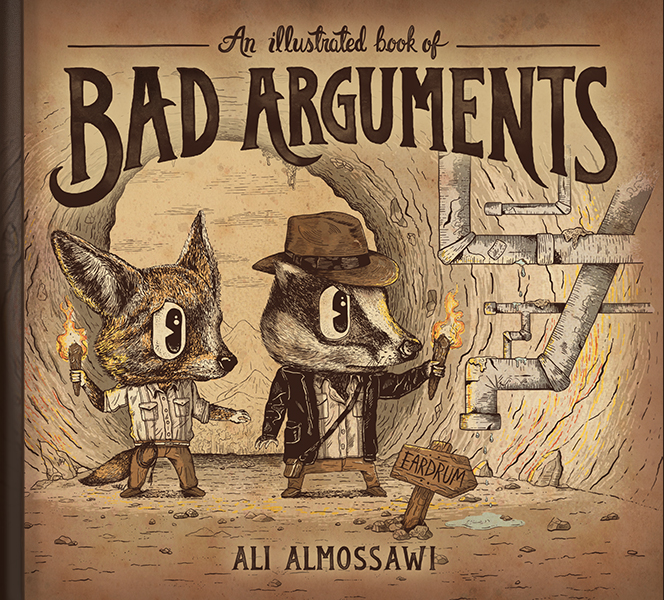
We are inundated all day by opinions of friends, family members, frenemies, colleagues, bosses, television commentators, newspaper columnists, radio hosts, political leaders, and ex-banker bloggers all making more or less ridiculous arguments in favor of their worldview.
We may frequently sense that they’re wrong, but we can’t quite put our finger on the flaw in their argument.
What a delight to discover a book to help categorize all the ways in which we all get it wrong, in the online-only An Illustrated Book of Bad Arguments, by Ali Almossawi.
I gather from his Preface to the book and his website that he’s a computer programmer, and that he works for the folks who make the Firefox internet browser.
The brilliant trick Almossawi accomplishes – via clever illustrations and a pithy style – is to invite the unsuspecting and easily-distracted into reading a pretty serious critique of illogical thinking. As he writes in the Preface, a good way to improve is to look at bad examples of the thing you’re trying to do. In his review of bad arguments, we can see more clearly mistakes we and others make.
Take an hour to read it. You may find yourself taking notes and vowing to think and reason a little more clearly.
An Illustrated Book of Bad Arguments, by Ali Almossawi
For the really easily distracted, here’s an even pithier list of Almossawi’s bad arguments, for which he provides good examples and clever pictures:
Argument from Consequences – appealing to wishes or fears, without due consideration of the logic of the argument
Straw Man – Exaggerating someone else’s claim in order to ridicule or dismiss
Appeal to Irrelevant Authority – Trusting the wrong source of authority
Equivocation – Changing the meaning of a word in the middle of an argument
False Dilemma – Creating only two possibilities to choose from, when in fact there are more than two choices
Not a Cause for a Cause – Connecting non-causally related events
Appeal to Fear – Similar to Slippery Slope, and possibly False Dilemma
Hasty Generalization – Too little data or sample size to make conclusions
Appeal to ignorance – No evidence for opposite view, therefore positive view of argument, ignoring burden of proof problem
No True Scotsman – General but unproved/unprovable claim about a category of things
Genetic Fallacy – Argument devalued or defended because of its history or origins
Guilt by Association – Linking argument to some unappealing association, or sharing an attribute with another group that is to be avoided
Affirming the Consequent – Using the false logic of “If A then C. Observing C, then A.” In other words, the wrong direction of causality
Appeal to Hypocracy – Countering a charge with a charge that is not logically connected
Slippery Slope – Saying acceptance will lead to a sequence of events. Related to Appeal to Fear, False Dilemma, Argument from Consequences
Appeal to Bandwagon – “All the cool kids” are doing something
Ad Hominem – Attack the person’s character
Circular Reasoning – Assume the conclusion in one or more premises
Composition & Division – Composition – the argument that a whole must have attributes because its parts have that attribute; and Division – the smaller part will take on the characteristics of the whole
Please also see related post: All Bankers Anonymous Book Reviews in one place!
Post read (8475) times.





One Reply to “Book Review: An Illustrated Book of Bad Arguments by Ali Almossawi”
Great little e-Book. It reminds me of my first philosophy class, Principles of Thinking. Wiki has a nice list of fallacies and biases (which seem to correlate with each other). For me the challenge is shifting my focus mid-way during a discussion…hmmm, which fallacy is he using right now…and still being able to concentrate on the actual discussion. However, I do notice that people who are excessively fallacious tend to have their favorites; the most common one I see is the straw man.